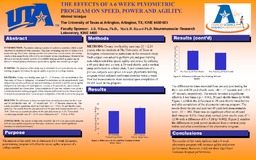
ATTENTION: The works hosted here are being migrated to a new repository that will consolidate resources, improve discoverability, and better show UTA's research impact on the global community. We will update authors as the migration progresses. Please see MavMatrix for more information.
Show simple item record
| dc.contributor.author | Istiaque, Ahmed | |
| dc.date.accessioned | 2017-04-25T20:37:55Z | |
| dc.date.available | 2017-04-25T20:37:55Z | |
| dc.date.issued | 2015 | |
| dc.identifier.uri | http://hdl.handle.net/10106/26627 | |
| dc.description | KINE 4400 | en_us |
| dc.description.abstract | INTRODUCTION: Plyometric training consists of explosive exercises which would otherwise be performed with resistance. This form of training can also be referred to a jump training. Plyometric training consists of a concentric muscle action (shortening) which is then immediately followed by an eccentric action (lengthening). Research has shown to accept plyometric exercise as a reliable training method in improving an athlete’s vertical jump performance, acceleration, agility, and overall leg strength.
PURPOSE: The purpose of this study was to determine if a 6-week plyometric, jump training, program will affect the speed, agility or power of a college student.
METHODS: Twenty two healthy men (age 21 + 2.24 years), who are students at The University of Texas at Arlington, volunteered to participate in this research study. Each subject was asked to perform pre and post training tests which tested for speed, agility and power by utilizing a 40 yard dash test, a t-test, a 20 yard shuttle, and a vertical jump performed on a force plate. Upon completion of a pre test, subjects were given a 6 week plyometric training program which subjects performed exercise twice a week. Post test measurements were recorded upon completion of the 6th week in the program.
RESULTS: The difference in times recorded from pre and post testing for the t-test and 20 yard shuttle were -.48 ±.17 seconds and -.15 ±.07 seconds, respectively. The results revealed a significant effect in T-test times ( p < 0.01), 20 yard shuttle times (p=0.00). The results from the pre and post test 40 yard dash measurements were -.02 ±.004. There was no significant effect on 40 yard dash times (p=0.15). Force plate vertical jump results were 47 ±12.06 with a difference of 8 ±5.24 (p=0.002).
CONCLUSION: The results of this study conclude that a 6 week plyometric program will increase agility and power performance, however, did not show significant increases in speed performance. | en_US |
| dc.description.sponsorship | Faculty Sponsor, J. R. Wilson | en_US |
| dc.description.sponsorship | Faculty Sponsor, Mark D. Ricard | en_us |
| dc.language.iso | en_US | en_US |
| dc.subject | plyometric training program | en_US |
| dc.subject | Post test | en_US |
| dc.subject | force plate | en_US |
| dc.title | THE EFFECTS OF A 6 WEEK PLYOMETRIC PROGRAM ON SPEED, POWER AND AGILITY. | en_US |
| dc.type | Presentation | en_US |
| dc.publisher.department | Department of Kinesiology, The University of Texas at Arlington | en_us |
| dc.publisher.department | Exercise Science Research Laboratories, The University of Texas at Arlington | en_us |
| dc.publisher.department | Neuromuscular Research Laboratory, The university of Texas at Arlington | en_us |
Files in this item
- Name:
- Istiaque A.pdf
- Size:
- 411.5Kb
- Format:
- PDF
- Description:
- PDF
This item appears in the following Collection(s)
Show simple item record


